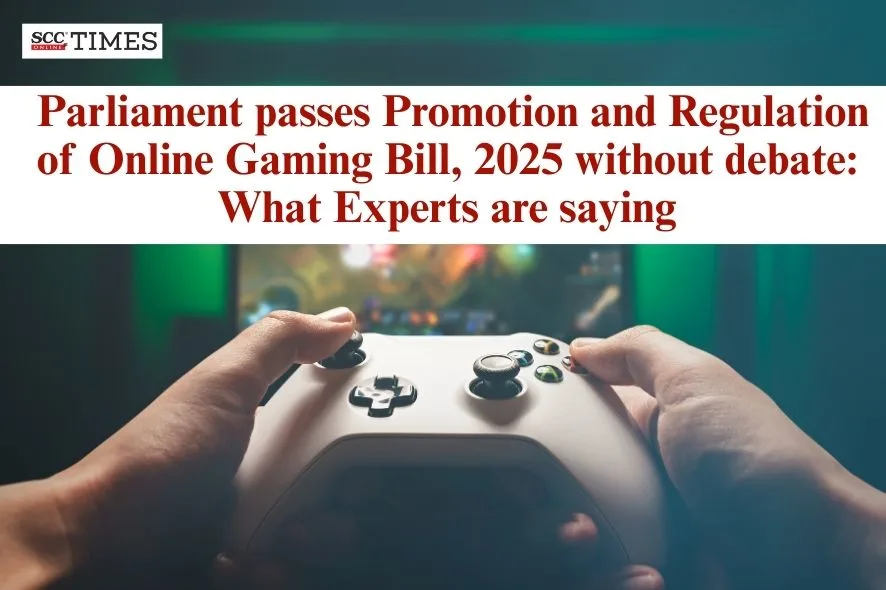The Promotion and Regulation of Online Gaming Bill, 2025 was introduced in Parliament on 20-8-2025 by Ashwini Vaishnaw, Minister of Railways, Information and Broadcasting and Electronics and Information Technology to establish a robust legal framework, not only prohibit online money gaming in the country but also to regulate, promote and encourage the sector for innovation and economic growth and ensure a developed, safe and responsible digital environment for all citizens. The Bill was passed by Lok Sabha without debate on 20-8-2025 and passed by Rajya Sabha on 21-8-2025.
All you need to know:
-
The purpose of Promotion and Regulation of Online Gaming Bill, 2025 is:
-
promote and regulate the online gaming sector including e-sports, educational games and social gaming;
-
to provide for the appointment of an Authority for coordinated policy support, strategic development and regulatory oversight of the sector;
-
to prohibit the offering, operation, facilitation, advertisement, promotion and participation in online money games through any computer resource, mobile device or the internet, particularly where such activities operate across State borders or from foreign jurisdictions;
-
to protect individuals, especially youth and vulnerable populations, from the adverse social, economic, psychological and privacy-related impacts of such games;
-
to ensure the responsible use of digital technologies;
-
to maintain public order and protect public health;
-
to safeguard the integrity of financial systems and the security and sovereignty of the State;
-
to establish a uniform, national-level legal framework in the public interest.
-
-
Need for tailored legal framework:
-
The online gaming sector has emerged as one of the fastest growing components of the creative economy as it contributes to innovation, employment generation and export earnings.
-
Any development in legal framework on online gaming sector will provide an opportunity for the country to assume a leadership role in the global value chain as India possesses a large pool of skilled young professionals, strong technological capabilities and a rapidly growing domestic market.
-
Today the online gaming sector has multiple segments- e-sports, online social games including casual games; and education games; and online money games but it operates without a dedicated institutional mechanism for strategic support, co-ordination and capacity building.
The absence of an enabling legal framework has adversely impacted the sector’s assured growth, development of common infrastructure, provision of specialised training and research in emerging technologies in the sector.
-
The unchecked and widespread proliferation of online money games which are easily accessible on mobile phones, computers, and the internet and offer money in exchange for deposited funds has led to grave social, economic, and psychological consequences.
-
These platforms often promote compulsive and addictive behaviour resulting in financial ruin, mental health disorders, and fraud and exploitation.
-
The algorithms used in online money games are often opaque and designed to manipulate user engagement secretly.
-
These games can also be operated by bots or undisclosed agents, undermining fairness and transparency.
-
These platforms have been linked to illegal activities including money-laundering, financial fraud, the financing of terrorism, and use as messaging platform for terrorist and terrorist organizations, thereby affecting the security and sovereignty of the State.
-
Therefore, there is a need to clearly delineate and categorize the different types of online games that are being offered and also to ensure that an appropriate enabling and legal framework is created to address the issues and concerns of each of the sub-sectors of online gaming.
Due to the negative impact of online games on individuals, families, and society it is necessary to completely prohibit the activity of online money gaming, rather than trying to regulate it.
3. In light of the scope of the development of online gaming sector:
-
it is required that there should be appropriate support and facilitation for an upright growth;
-
and due to increasing social, financial, and regulatory risks posed to the interest of the general public by the online money gaming sector, including those relating to consumer protection, public health, public order, and national security, it is expedient in the public interest for the Union Government to take control over this emerging industry.
Our Expert, Mr. L. Badri Narayanan, Executive partner, Lakshmikumaran & Sridharan Attorneys, shared his views on the Bill, stating,
“As someone who has closely been engaged with the online gaming sector for over a decade, I believe the government’s recent approach risks conflating legitimate, well-regulated businesses with illegal or clandestine operators. Major companies in this industry have robust compliance frameworks, responsible gaming policies, and provide substantial employment, with around two lakh people directly or indirectly involved. While there is a need to address illegitimate platforms, imposing an outright ban impacts compliant enterprises and does little to curb illegal activities, which often operate underground. The legislative approach of introducing this bill without industry / stakeholder consultation, especially in a sector that has attracted over Rs. 25,000 crore in FDI, risks sending the wrong signal to the global investors about India as an investment destination.”
He further added,
“Internationally, leading jurisdictions like the US and UK have demonstrated that responsible regulation is both feasible and effective, with most players engaging for minimal stakes—98% spend less than ₹200 per game. A balanced approach, such as age restrictions and blackout periods as seen in Tamil Nadu, ensures consumer protection without stifling innovation or employment. Constitutionally, an absolute central ban on skill-based games may face challenges, given that gambling is a state subject and such a prohibition could conflict with both state laws and judicial precedent.”
For more expert insights from Lakshmikumaran & Sridharan Attorneys, read here.








Unhappy that government seeks to ban things it could not regulate, showing incapability at it’s part